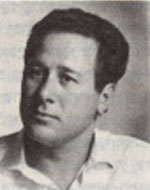Netzer, Yehoshafat
Yehoshafat, son of Tanhuma, and Shaul was born on May 12, 1940, in Tel Aviv, He studied at the Be’eri elementary school in Jaffa, at the Reali Gymnasium in Rishon Letzion, and then was educated for two years at the educational institution at Kibbutz Mizra, where he acquired the nickname Yehu. he was a good-looking boy His childhood was full of charm, but he also knew the terror of the War of independence. at a young age, Yehoshafat became acquainted with the world of music. From the experience of introductions onwards, he listened to countless hours of classical music. From the age of nine he began to visit museums, learned to observe games of shapes and colors, and became acquainted with painting and sculpture. Later, archeology was also his hobby. When Yehoshafat was a student at the Be’eri elementary school, he joined the Hashomer Hatzair youth movement. He was a sociable boy, active in trips and celebrations, and also the editor of the Ken newspaper. Yehoshafat was an excellent student, kind to his teachers and young friends. Yehoshafat was drafted into the IDF in mid-November 1958. His request to serve as a pilot in the air force was rejected because a doctor who had a defect in the vertebrae forbade him to parachute but nevertheless refused to allow him to parachute. He was an excellent soldier and was ready to help anyone else as an only child, he could easily have been discharged from service in a combat unit, but as a young man who was educated at home on The love of the Land of Israel, he found it difficult to understand why he was unusual, In the Six-Day War, Yehoshafat took part as a forceman who broke into the Suez Canal through Jabel Livni and Masri Al-Gidi, and in the summer of 1968 he was awarded a Bachelor’s degree with honors on behalf of Tel Aviv University, in the fields of General History and History of the Middle East and Africa, and completed his studies at the Pedagogic Department of Tel Aviv University, was ordained as a high school teacher and served as a history teacher at the Kugel High School in Holon. In his past achievements, he enlisted to study for a master’s degree in the Department of Middle Eastern Studies and worked hard Which was written under the guidance of the heads of the “Shiloah Institute.” At the same time, Yehoshaphat continued to teach in high school, served as a lecturer at Menashe College in Hadera and at the IDF Command and Staff School. On October 9, 1973, Yehoshaphat was killed during a heavy artillery shelling in the Ramat Magshimim area. Yehoshafat was brought to eternal rest in the military cemetery in Kiryat Shaul and left behind a wife, Liora, son of Nitai and a mother, was promoted to the rank of First Sergeant.
